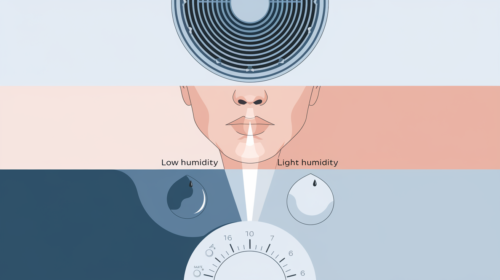Can an Air Purifier Dry Out the Nose? Causes and Solutions
Contrary to popular belief, air purifiers do not inherently dry out the air or your nose. Most air purifiers, especially those using HEPA filters or activated carbon, don’t affect humidity levels. They work by cleaning the air, removing allergens, dust, and pollutants without altering moisture content.
Key Fact: Air purifiers don’t reduce humidity levels unless they’re combined with a dehumidifier function.
Why Your Nose Might Feel Dry?
If you’re experiencing dryness while using an air purifier, consider these factors:
1. Low Humidity Levels:
In winter or arid climates, indoor air can be naturally dry.
2. Overuse of Air Purifiers:
Constant high-speed operation might create a sense of “over-processed” air.
3. Pre-existing Conditions:
Allergies, sinusitis, or certain medications can dry out nasal passages.
4. Proximity to the Device:
Sitting too close to the air purifier may result in a focused stream of air.

Common Myths About Air Purifiers and Dryness
Myth 1: Air Purifiers Are Like Dehumidifiers
Many people confuse air purifiers with dehumidifiers. While dehumidifiers actively remove moisture from the air, purifiers only filter out airborne particles.
Myth 2: All Air Purifiers Cause Dryness
Standard HEPA and activated carbon air purifiers don’t cause dryness. However, ionizers or ozone generators may irritate nasal passages due to their byproducts, which is different from drying out your nose.
Preventing Nose Dryness While Using an Air Purifier
1. Maintain Proper Humidity:
Use a humidifier alongside your air purifier to keep indoor humidity between 30-50%.
2. Adjust Purifier Settings:
Avoid running your air purifier on the highest setting constantly.
3. Strategic Positioning:
Keep the purifier at least 3-6 feet away from where you sit or sleep.
4. Stay Hydrated:
Drink plenty of water to keep your nasal passages naturally moist.
5. Choose the Right Purifier:
Opt for HEPA or carbon-filter-based purifiers to minimize irritation.
Choosing the Right Air Purifier
When selecting an air purifier, consider:
1. HEPA Filtration:
Look for purifiers that can remove 99.97% of particles as small as 0.3 microns.
2. Activated Carbon:
This helps remove odors and gaseous pollutants.
3. Room Size Compatibility:
Ensure the purifier’s Clean Air Delivery Rate (CADR) matches your room size.
4. Noise Levels:
Check for quiet operation modes, especially for bedroom use.
5. Avoid Ozone Generators:
Steer clear of ionic air cleaners or ozone generators.
Final Words
While air purifiers don’t directly dry out the air or your nose, they can contribute to discomfort in already dry environments. By understanding how these devices work and taking proactive measures, you can enjoy cleaner air without experiencing nasal dryness. Pair your air purifier with a humidifier, stay hydrated, and adjust settings as needed to ensure a comfortable and healthy atmosphere.
Remember, the key to preventing a dry nose while using an air purifier is maintaining proper humidity levels and choosing the right type of purifier for your needs.
Freqently Asked Questions
Can air purifiers cause nosebleeds?
Indirectly, prolonged dryness can lead to cracked nasal membranes, increasing nosebleed risk.
Can children or seniors be more affected by dryness?
Yes, their nasal passages are more sensitive. Consider using a humidifier alongside the air purifier.
Do certain air purifier brands prevent dryness better?
Some brands offer purifiers with built-in humidifiers, which can help combat dryness.
Should I stop using my air purifier if my nose feels dry?
Not necessarily. Address the root cause, such as low humidity, and adjust your purifier's settings.
About Author
Tayyabah Zahoor is an expert writer with a Bachelor's degree in Physics. She specializes in creating content for affiliate websites, particularly about air purifiers. Using her scientific knowledge, she compares different air purifiers by analyzing their features and effectiveness. This helps her provide clear and helpful information to consumers looking for the best options.
